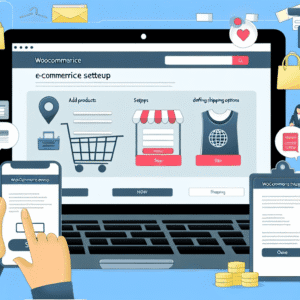In today’s digital age, cybersecurity is more than just a buzzword—it’s a necessity for businesses of all sizes, especially for Small and Medium Enterprises (SMEs). In Nigeria, where businesses are rapidly integrating technology into their operations, the importance of robust cybersecurity measures cannot be overstated. As threats evolve, SMEs must prioritize protecting their data to ensure continuity and build trust with their customers.
Understanding Cybersecurity
Cybersecurity is the practice of protecting systems, networks, and programs from digital attacks. These cyberattacks aim to access, change, or destroy sensitive information or even extort money from users. SMEs are often seen as the low-hanging fruit by cybercriminals because they may lack the robust security measures that larger organizations implement.
The Cybersecurity Landscape in Nigeria
Nigerian SMEs are increasingly more dependent on technology, but they often operate on limited budgets. According to recent studies, many SMEs do not have a dedicated IT security team, making them vulnerable to various attacks, including phishing, ransomware, and data breaches.
Essential Cybersecurity Strategies for SMEs
Conduct Regular Risk Assessments
Understanding the specific risks your business faces is the first step in fortifying your defenses. Regular risk assessments can help identify vulnerabilities in your systems. Create a checklist that evaluates your hardware, software, and human resources. By knowing where your weaknesses lie, you can devise a targeted strategy to mitigate these risks.
Implement Strong Password Policies
One of the simplest yet most effective steps to improve cybersecurity is to enforce strong password policies. Encourage employees to use complex passwords that include a mix of letters, numbers, and special characters. Additionally, consider implementing multi-factor authentication (MFA) to provide an extra layer of security. This way, even if a password is compromised, unauthorized access is still prevented.
Educate Your Employees
Human error is one of the leading causes of cybersecurity breaches. Training employees on the importance of cybersecurity and how to recognize potential threats can significantly reduce risks. Conduct regular training sessions that cover topics like how to identify phishing emails and the importance of securing sensitive data.
Keep Software Updated
Regularly updating software and operating systems is crucial to maintaining security. Software developers often release updates to address vulnerabilities. Failing to apply these updates can leave your business exposed to cyber threats. Implement automatic updates wherever possible, and set reminders to manually check critical systems.
Use Firewall and Antivirus Software
A robust firewall acts as a barrier between your network and malicious activity from the internet. It filters incoming and outgoing traffic based on established security rules. Invest in reputable antivirus software that can detect and neutralize threats. Ensure that both of these elements are regularly updated and monitored.
Regularly Back Up Data
Data loss can be devastating for any business. Regularly backing up your data ensures that you can restore information in the event of an attack or hardware failure. Use a combination of local and offsite backups to create a comprehensive recovery strategy. Cloud-based solutions are also an excellent option for easy data restoration.
Develop an Incident Response Plan
Even with the best preventative measures, cyber incidents can still occur. Having a well-defined incident response plan can help you react swiftly and minimize damage. This plan should outline the steps to be taken during a cyber incident, including who to contact, how to isolate affected systems, and how to communicate with customers and stakeholders.
Limit Access to Sensitive Information
Not all employees need access to every piece of information. Implement role-based access controls to limit access to sensitive data on a need-to-know basis. This minimizes the risk of insider threats and reduces the potential impact of data breaches.
Monitor Your Network
Continuous monitoring of your network can help you detect unusual activity before it escalates into a larger problem. Utilize security information and event management (SIEM) tools that can analyze and track potential threats in real time. Early detection is key to responding effectively to breaches.
Consider Outsourcing to Managed Service Providers
If your SME lacks the resources to manage cybersecurity internally, consider outsourcing to a Managed Service Provider (MSP). MSPs can offer comprehensive services, including 24/7 monitoring, threat detection, and incident response, ensuring that your data is continuously protected.
FAQs
What are the most common cybersecurity threats for SMEs?
The most common threats include phishing, ransomware, malware, and data breaches. SMEs are often targeted due to their lack of robust security measures.
How can I create a strong password?
A strong password should include at least 12 characters, mixing uppercase and lowercase letters, numbers, and special symbols. Avoid using easily guessable information like birthdays or pet names.
What should I do if I suspect a data breach?
Immediately isolate the affected systems to prevent further compromise. Inform your IT team and any relevant authorities. Follow your incident response plan for next steps.
How often should I update my software?
Aim to update your software regularly—at least once a month. Set automatic updates where possible to ensure you don’t miss critical patches.
What is a Managed Service Provider?
A Managed Service Provider (MSP) is a third-party company that offers IT services, including cybersecurity, to organizations. They can provide dedicated support, allowing SMEs to focus on their core business functions.
Call to Action
Protecting your business from cyber threats is not just an IT issue; it’s a business imperative. If you’re ready to elevate your cybersecurity strategy, consider partnering with Nikenga Web Services. Our expert team specializes in managed hosting, marketing, and development tailored to meet the unique needs of Nigerian SMEs. Let us help you safeguard your data and ensure a secure future for your business. Contact us today to learn more!





